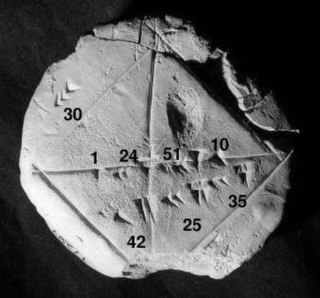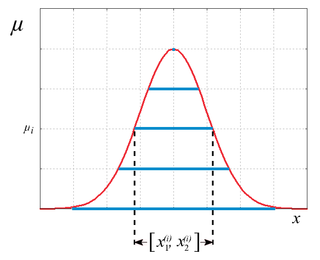Fuzzy logic is a form of many-valued logic in which the truth value of variables may be any real number between 0 and 1. It is employed to handle the concept of partial truth, where the truth value may range between completely true and completely false. By contrast, in Boolean logic, the truth values of variables may only be the integer values 0 or 1.
Computational archaeology describes computer-based analytical methods for the study of long-term human behaviour and behavioural evolution. As with other sub-disciplines that have prefixed 'computational' to their name, the term is reserved for methods that could not realistically be performed without the aid of a computer.

Lotfi Aliasker Zadeh was a mathematician, computer scientist, electrical engineer, artificial intelligence researcher, and professor of computer science at the University of California, Berkeley. Zadeh is best known for proposing fuzzy mathematics, consisting of several fuzzy-related concepts: fuzzy sets, fuzzy logic, fuzzy algorithms, fuzzy semantics, fuzzy languages, fuzzy control, fuzzy systems, fuzzy probabilities, fuzzy events, and fuzzy information. Zadeh was a founding member of the Eurasian Academy.
Computational science, also known as scientific computing, technical computing or scientific computation (SC), is an area of science that uses advanced computing capabilities to understand and solve complex physical problems. This includes
The expression computational intelligence (CI) usually refers to the ability of a computer to learn a specific task from data or experimental observation. Even though it is commonly considered a synonym of soft computing, there is still no commonly accepted definition of computational intelligence.

Joseph Amadee Goguen was an American computer scientist. He was professor of Computer Science at the University of California and University of Oxford, and held research positions at IBM and SRI International.

Computational mathematics is an area of mathematics devoted to the interaction between mathematics and computer computation.

George Jiří Klir was a Czech-American computer scientist and professor of systems sciences at Binghamton University in Binghamton, New York.
Type-2 fuzzy sets and systems generalize standard Type-1 fuzzy sets and systems so that more uncertainty can be handled. From the beginning of fuzzy sets, criticism was made about the fact that the membership function of a type-1 fuzzy set has no uncertainty associated with it, something that seems to contradict the word fuzzy, since that word has the connotation of much uncertainty. So, what does one do when there is uncertainty about the value of the membership function? The answer to this question was provided in 1975 by the inventor of fuzzy sets, Lotfi A. Zadeh, when he proposed more sophisticated kinds of fuzzy sets, the first of which he called a "type-2 fuzzy set". A type-2 fuzzy set lets us incorporate uncertainty about the membership function into fuzzy set theory, and is a way to address the above criticism of type-1 fuzzy sets head-on. And, if there is no uncertainty, then a type-2 fuzzy set reduces to a type-1 fuzzy set, which is analogous to probability reducing to determinism when unpredictability vanishes.

A fuzzy number is a generalization of a regular real number in the sense that it does not refer to one single value but rather to a connected set of possible values, where each possible value has its own weight between 0 and 1. This weight is called the membership function. A fuzzy number is thus a special case of a convex, normalized fuzzy set of the real line. Just like fuzzy logic is an extension of Boolean logic, fuzzy numbers are an extension of real numbers. Calculations with fuzzy numbers allow the incorporation of uncertainty on parameters, properties, geometry, initial conditions, etc. The arithmetic calculations on fuzzy numbers are implemented using fuzzy arithmetic operations, which can be done by two different approaches: (1) interval arithmetic approach; and (2) the extension principle approach.

The Institute of Mathematics and Applications (IMA), located in Bhubaneswar, Odisha, in India, is a research and education institution that was established by the Government of Odisha in 1999. Its dual purposes are to conduct advanced research in pure and applied mathematics and to provide postgraduate education leading to master's and Ph.D. degrees in mathematics, computation, computational finance, and data science. The institute also runs training programs in schools aimed at increasing mathematics awareness and leading to competitions such as the Mathematics Olympiads. The UG and PG courses are currently affiliated to Utkal University, which is the largest affiliating university in the country.
Perceptual computing is an application of Zadeh's theory of computing with words on the field of assisting people to make subjective judgments.

Vladik Kreinovich is a professor of computer science at the University of Texas at El Paso.

Rudolf Kruse is a German computer scientist and mathematician.

Combinatorics, Probability and Computing is a peer-reviewed scientific journal in mathematics published by Cambridge University Press. Its editor-in-chief is Béla Bollobás.

Dyusembaev Anuar is a Kazakh mathematician.

Janusz Kacprzyk is a Polish engineer and mathematician, notable for his contributions to the field of computational and artificial intelligence tools like fuzzy sets, mathematical optimization, decision making under uncertainty, computational intelligence, intuitionistic fuzzy sets, data analysis and data mining, with applications in databases, ICT, mobile robotics and others.

Ismat Beg, FPAS, FIMA, is a Pakistani mathematician and researcher. Beg is a senior full professor at Lahore School of Economics, Higher Education Commission Distinguished National Professor and an honorary full professor at the Mathematics Division at the Ruggero Santilli Institute for Basic Research, Florida, US. He has an enthusiastic and interactive teaching style and is famous for saying “please come on the board” when posed with a question in class. This helps uplift the students’ confidence.

Computational Optimization and Applications is a peer-reviewed academic journal published by Springer Science+Business Media. The journal focuses on the analysis and development of computational algorithms and modeling technology for optimization. It also covers linear programming, computational complexity theory, automatic differentiation, approximations and error analysis, parametric programming, sensitivity analysis, and management science.













